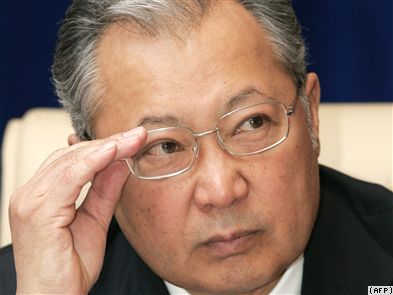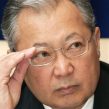
Kyrgyz Government Orders Religious Leaders to Wear Special Uniform
Publication: Eurasia Daily Monitor Volume: 6 Issue: 69
By:

Kyrgyz President Kurmanbek Bakiyev’s latest attempts to increase political control over the Spiritual Administration of Muslims (SAM) suggests that he is using religion as part of his campaign ahead of the presidential election in July. Bakiyev supported the idea of building a large mosque in Bishkek, while special uniforms for the SAM leaders are designed by the government mixing religious and ethnic symbols. According to the government, the new uniform for SAM leaders portrays a blend of "native" Kyrgyz and Islamic features. The new costumes for imams will be decorated with traditional embroidery and a tag depicting the Black Stone in Mecca. SAM leaders will be required to wear the uniform during their daily activities. The top leadership of its administration will be dressed in gowns with more complex ornamental motifs (www.24.kg, April 8).
Mixing religion with ethnic symbols helps Bakiyev to build further support in various parts of the country. According to one NGO leader in Bishkek, Bakiyev’s support for the mosque construction project will appeal to the sentiments of the more traditional and conservative amongst the Kyrgyz population, which would like to identify itself as genuine Muslims. By simultaneously demonizing the non-state practices of Muslim groups, Bakiyev is trying to accommodate abstract fears among the Kyrgyz public.
In January, Bakiyev adopted a law restricting the freedom of religious groups within the country. According to the law, any religious group would only be able to receive legal registration if it had over 200 members, instead of the previously required lower threshold of ten (EDM, July 22, 2008). The law was supported by both SAM and the Russian Orthodox Church that condemn the rapidly spreading dimensions of Christianity and Islam within the country. The official establishments showed their preference to cooperate with the government against movements that have been expanding mostly thanks to proselytism.
Despite the fact that Kyrgyzstan is a secular state, Bakiyev has been actively calling for SAM’s greater engagement in the spiritual lives of Kyrgyz citizens. Politicians concerned with the spread of extremism criticize SAM for failing to oversee the functioning of all mosques, spiritual education of local imams, interpretation of the Koran, and the spread of extremist literature amongst the population (www.24.kg, March 20). To prove its efficiency, SAM regularly raids religious schools and allocates quotas for pilgrimage to Mecca.
In this manner, SAM is becoming a more important player in the government’s campaign against religious extremism. This elevates SAM’s political role and justifies the government’s actions. Therefore, the state’s relationship with SAM is becoming increasingly politicized, more reminiscent of a patron-client link between the religious clergy and the regime. Both the government and SAM prefer to point to their separation and the latter calls on its members to avoid politics, but in practice both are developing mutually beneficial relations.
For many state officials arguing for the adoption of the law, the previous lack of governmental control over indigenous religious institutions was regarded as a weakness. The head of the state agency on religious issues Kanybek Osmonaliyev, lauded the law, warning that the spread of religious movements will eventually split the nation (www.24.kg, January 22).
Bakiyev has been imposing his authority over SAM in the absence of any meaningful debate about the role of the state in the religious sphere. The president ignored the international community’s pressure and numerous local NGOs’ calls for a more liberal legislature. By extending his authority over SAM, Bakiyev has further eliminated the possibility that any other political leaders would play the religious and ethnic identity cards in their own election campaigns. As Sebastien Peyrouse, Senior Research Fellow with the Central Asia-Caucasus, noted, religion is linked to a titular ethnic group in the Central Asian states. The practice of "instrumentalizing" religion by Central Asia’s political leaders reflects a Soviet legacy and "religion appears as one of the mobilizing elements of national identity," argues Peyrouse (Journal of Church and State, Winter 2007).
Essentially, Bakiyev’s control over the country’s religious institutions falls into the same category as his rule over the security structures. Both have been collaborating actively in defining and persecuting what they consider to be extremist forms of Islam. Shortly after adopting the law, the Minister of Interior Moldomusa Kogantiyev, promised that in 2009 his ministry will consult with SAM more frequently (www.24.kg, January 12). As an expression of partnership in the security sector, SAM regularly publicly confirms the government’s fears of extremist forms of religious practices. Indeed, SAM is expected to show support toward Bakiyev in the July elections, confirming its symbiotic relationship with the regime.




